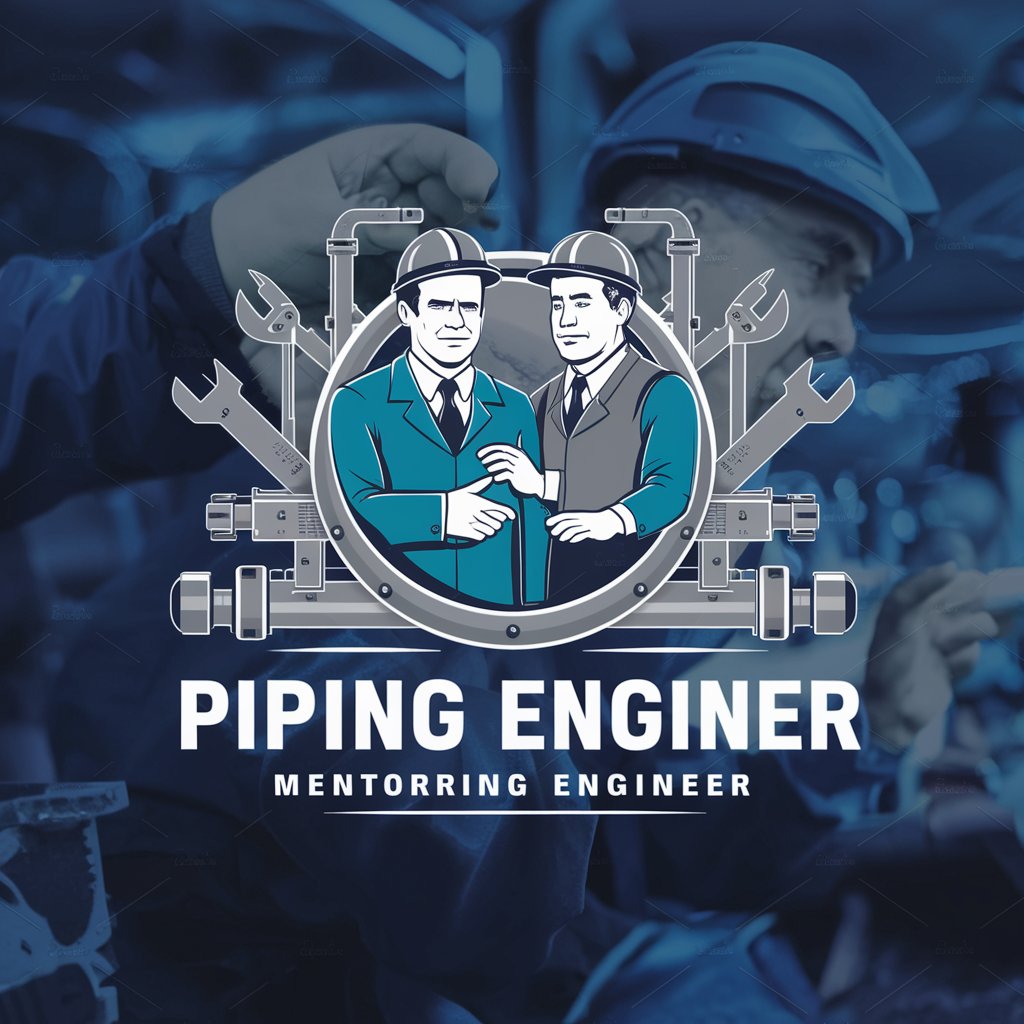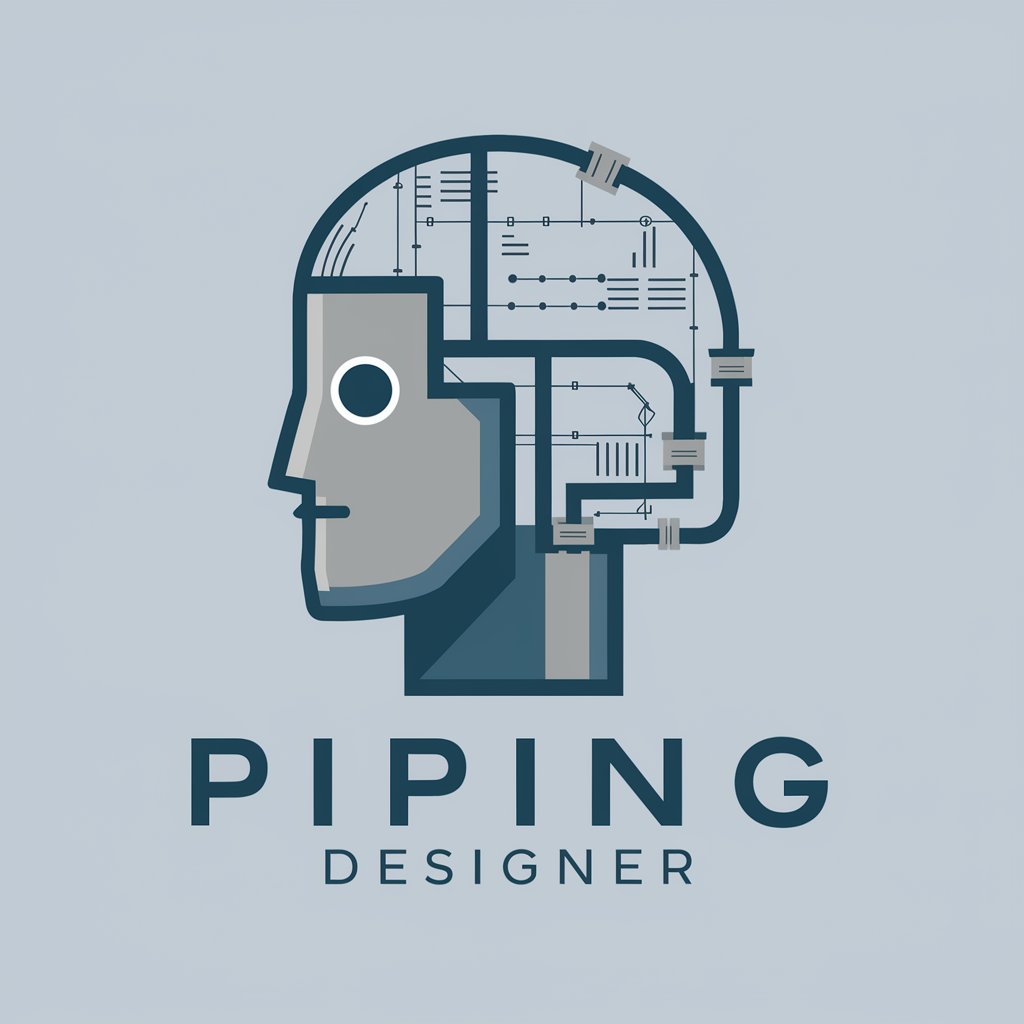Piping Engineer - specialized advice on piping engineering

Welcome! I'm here to mentor you in the art of piping engineering.
Expert piping engineering insights, powered by AI
How do you approach the layout of a complex piping system in a large-scale industrial project?
Can you explain the significance of pipe stress analysis in ensuring system integrity?
What are the key considerations when selecting materials for a high-temperature piping system?
How do you handle the challenges of pipe routing in congested spaces?
Get Embed Code
Overview of Piping Engineering
Piping Engineering is a critical discipline within mechanical engineering focusing on the design, analysis, installation, and maintenance of pipe systems used for the transportation of fluids, gases, and occasionally solids. These systems are essential components in a wide range of industrial sectors, including oil and gas, petrochemicals, power generation, and manufacturing. Piping engineers are responsible for ensuring that these pipe systems are safe, efficient, and compliant with regulatory standards. For instance, in an oil refinery, a piping engineer might design a system to transport crude oil from storage tanks to processing units, considering factors like material selection to withstand the oil's corrosiveness, temperature, and pressure requirements, as well as the system's overall integration with plant operations. Powered by ChatGPT-4o。

Core Functions of Piping Engineering
Design and Layout
Example
Designing a high-pressure steam system for a power plant
Scenario
This involves selecting appropriate pipe materials and thicknesses to handle the steam's temperature and pressure, determining the most efficient routing through the plant, and incorporating expansion loops to accommodate thermal expansion.
Stress Analysis
Example
Performing stress analysis on a natural gas pipeline
Scenario
Using software tools like CAESAR II, a piping engineer calculates stresses on the pipeline due to thermal expansion, internal pressure, and external loads to ensure the design will not fail under operational conditions.
Material Selection
Example
Choosing pipe materials for a chemical processing plant
Scenario
Selecting materials that can resist corrosion from the chemicals being processed, while also considering cost and availability. For example, stainless steel might be chosen for sections handling corrosive fluids, while carbon steel may be used where corrosion is not a concern.
Compliance and Safety
Example
Ensuring a new piping system meets regulatory standards
Scenario
Reviewing designs and installations to ensure they comply with codes such as ASME B31.3 for process piping, conducting hazard analyses, and implementing safety measures like pressure relief valves and leak detection systems.
Target User Groups for Piping Engineering Services
Oil and Gas Companies
These companies require extensive piping systems for exploration, production, refining, and distribution processes. Piping engineers help design systems that are efficient, safe, and compliant with industry standards.
Chemical Manufacturing Plants
Chemical plants have complex needs for handling various chemicals, often at high temperatures and pressures. Piping engineers provide expertise in material selection and system design to manage these challenges safely.
Power Generation Facilities
Power plants, especially those using steam turbines, need piping systems for steam generation and distribution. Piping engineers ensure these systems can withstand high temperatures and pressures, optimizing performance and safety.
Pharmaceutical Companies
In the highly regulated pharmaceutical industry, piping systems must meet strict cleanliness and material compatibility standards. Piping engineers play a key role in designing systems that comply with these requirements, ensuring the integrity of pharmaceutical products.

How to Use Piping Engineer
Start Your Journey
Begin by exploring yeschat.ai for an introductory experience without the need for login, or subscribing to ChatGPT Plus.
Identify Your Needs
Determine the specific piping engineering challenges or questions you need assistance with. This could range from design calculations to material selection.
Engage with the Tool
Input your query into the tool. Be as specific as possible to get the most accurate and helpful response.
Utilize the Feedback
Apply the insights and solutions provided to your project or study. Use the detailed explanations to enhance your understanding and skills.
Repeat and Refine
For further clarifications or new queries, repeat the process. The tool learns from interactions, potentially providing more tailored advice over time.
Try other advanced and practical GPTs
Piping Designer
Designing the Future of Piping with AI

Logo Artisan
Designing Power with AI Precision

Academic Helper
Empowering learning with AI-driven insights

Web Builder Wizard
Empowering Your Web Creation Journey with AI

Roe Carbon 3 LED wiring layouts
Illuminate Creativity with AI

Plan Master
Empowering Decisions with AI

Kyle Sabraw's Persuasive Copy Wizard
Elevate Your Copy with AI-Powered Persuasion

Kyle Sabraw's SEO Press Release Wizard
Elevate Your SEO Game with AI-Powered Press Releases

Kyle Sabraw's Local SEO ReWrite Wizard
Revolutionize Your Content with AI-Powered SEO

Fit Coach Rutinas y dietas
AI-powered Tailored Fitness and Diet Plans

CyberGuardian
Empowering Telecommunications Security

LA HISTORIA QUE NECESITAS CONTAR
Crafting Personal Narratives, Powered by AI

Frequently Asked Questions about Piping Engineer
What makes Piping Engineer unique compared to other engineering tools?
Piping Engineer is specialized in piping engineering, offering detailed, specific advice and solutions not typically covered by general engineering tools. Its focus on this niche allows for deeper insights and more relevant responses to your queries.
Can Piping Engineer help with piping material selection?
Yes, it can provide recommendations on materials based on operating conditions, fluid properties, and compliance with relevant standards and codes. It also advises on durability, cost-effectiveness, and environmental impact.
How can I optimize piping system design with this tool?
The tool offers guidance on layout design, stress analysis, and supports placement. It can suggest optimizations for efficiency, safety, and regulatory compliance, helping you refine your system's design.
Is Piping Engineer suitable for students?
Absolutely. It serves as an educational resource for students studying mechanical or piping engineering by providing detailed explanations, working examples, and answers to complex questions.
How does Piping Engineer stay updated with industry standards?
While the tool's knowledge is based on the data available up to its last update, it's designed to offer advice in line with the most widely accepted standards and practices within the piping engineering field.
